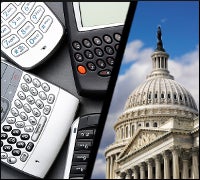 |
WASHINGTON — AT&T might not want to give up its exclusive iPhone deal. But what if Congress forced its hand?
As they begin work on legislation that could change the way wireless companies do business, members of a House subcommittee today heard testimony from witnesses who diagnosed the various ails of the mobile market.
Their principal concern was that AT&T (NYSE: T) and Verizon (NYSE: VZ), and, to a lesser extent, Sprint and T-Mobile, have so strong a hold on the wireless industry that they can use their market clout to choke off competition.
The four major carriers account for more than 90 percent of the wireless market, but consumer advocates calling for more competition in the wireless industry are primarily worried about AT&T and Verizon.
“This industry is moving very quickly toward duopoly, or a quasi-duoply, and that concerns us,” said Chris Murray, senior counsel at Consumers Union, the nonprofit publisher of Consumer Reports. “I’m very concerned about anticompetitive behavior I see in the industry and would beg this committee for more oversight,” Murray told members of the House Subcommittee on Communications, Technology and the Internet this morning.
AT&T and Verizon were invited to testify at today’s hearing but declined, an aide to committee Chairman Rick Boucher, D-Va., told InternetNews.com.
As a result, much of the testimony of the witnesses was dominated by calls for policies that would limit their market power, including ending exclusivity agreements like the one that locks the iPhone into AT&T’s wireless service.
“Imagine a world in which Macintosh computers only worked on AT&T DSL,” said Victor Meena, president of the wireless carrier Cellular South. “The situation with exclusivity agreements is bad and only getting worse.”
Meena said that carriers like Cellular South are at a competitive disadvantage because they aren’t big enough to land exclusive smartphone deals with the major device makers.
But don’t those same agreements force the larger carriers into vigorous competition over which company gets to boast that its network offers the sleekest new handset on the market?
“A lot of the competition in the wireless industry occurs in the device,” said George Ford, chief economist at the Phoenix Center, a Washington think tank. “I think unquestionably, in this industry if you prohibit that kind of arrangement, you’re going to reduce competition.”
Ford was something of an anomaly among the witnesses. An ardent free marketeer, he argued that the infrastructure behind telecom networks is so costly to build and maintain that the industry by its nature will never see a multitude of competitors.
[cob:Special_Report]”You can hope for some things you can never have. Economics drive this thing — you cannot just say ‘I want more competition,'” Ford said, describing the industry as it stands as “workably competitive.”
“The relatively concentrated nature of wireless telecommunications is natural and is to be expected,” he said. “‘Duopoly’ is not a dirty word.”
Ford’s analysis resonated with several Republicans on the panel, but California Democrat Anna Eshoo bristled.
“That just flies in the face of what I think America is about and our whole system of belief in competition,” she said in response to Ford’s comment about duopolies.
Aside from putting checks on devices exclusivity agreements, lawmakers are also considering reforms to policies governing wireless spectrum and the cost and terms of special access, the fees carriers exact from smaller providers operating on their data networks. The Federal Communications Commission deregulated special-access pricing in 1999.
Critics claim that one of the Bell incumbents, either AT&T, Verizon or Quest, dominates special access in almost every region in the country, allowing them to gouge their smaller competitors for use of their networks. Even larger carriers like Sprint rely heavily on the Bells for their network backhaul.
“It is a monopoly right now, with extremely difficult terms and conditions we have to put up with,” said Paul Schieber, Sprint’s vice president of access and roaming. Schieber called special access the “lifeblood of the industry.” Sprint has been urging the FCC to rein in special access costs, a matter the agency has been considering for several years.
The legislation Boucher is considering builds on an unsuccessful effort by Ed Markey, the subcommittee’s previous chair, to establish a nationwide regulatory framework for wireless carriers in the last Congress.


